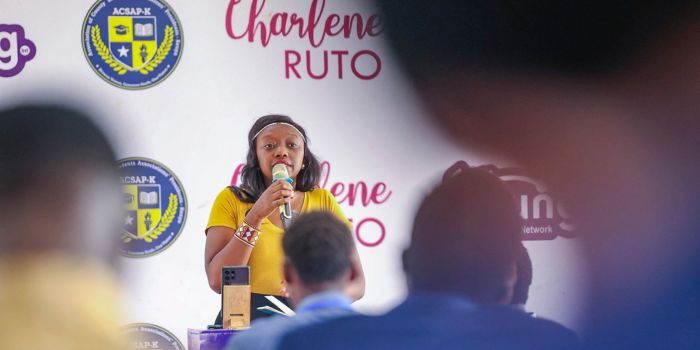Author Webster Elijah Ochora is officially a free man after Charlene Ruto, daughter of President William Ruto, extended her forgiveness over the publication of an unauthorized book about her life and work.
The decision brings to a close a legal dispute that had drawn national attention and sparked wider debate on freedom of expression, digital rights, and responsible authorship.
In a heartfelt statement released on Monday, July 28, Charlene announced that she had chosen to settle the matter out of court, highlighting the importance of dialogue, forgiveness, and youth empowerment.
“Over the past few weeks, I have received persistent appeals through my legal counsel (Kachapin & Company Advocates) from Webster Ochora Elijah.
His words and the sincerity behind them have touched me deeply,” Charlene said.
“As a youth champion and as someone deeply committed to positive dialogue and responsible leadership, I have chosen to extend forgiveness.
I have also agreed to pursue alternative dispute resolution outside the courts.”
Ochora had been arrested on June 2 and detained at Muthaiga Police Station after being accused of authoring Beyond the Name: Charlene Ruto and the Youth Uprising without Charlene’s knowledge or consent.
He was later charged with identity theft under the Computer Misuse and Cybercrime Act.

The arrest raised eyebrows within legal and literary circles.
Ochora’s lawyer, Kennedy Mong’are, insisted that the book intended no malice and instead sought to celebrate Charlene’s achievements and influence among Kenya’s youth.
Mong’are noted that Ochora is a seasoned writer who has authored works on high-profile figures such as former Prime Minister Raila Odinga and U.S. President Donald Trump.
Senior advocate Evans Ondieki went further, describing the arrest as “unlawful” and “politically motivated,” arguing it threatened the foundational right to freedom of expression.
In her statement, Charlene emphasized that her initial legal action was not personal, but rather intended to address a broader concern: the unchecked harm caused by digital impersonation and misinformation.
“I took this legal step not only to protect my name but also to stand up for the many people especially young people who suffer in silence from online abuse, with no voice and no avenue for justice,” she explained.
“People whose careers have been damaged, whose mental health has been compromised, and whose dignity has been stripped away by targeted digital attacks.”
Nonetheless, in choosing forgiveness, Charlene signaled a desire to shift the narrative toward healing and constructive engagement.
Ochora has not publicly responded to Charlene’s statement, but sources close to the author say he is relieved by the outcome and is eager to move forward.
Legal analysts say the decision sets a precedent for embracing alternative dispute resolution in digital-era legal conflicts, particularly where reputational harm and freedom of speech intersect.
The case now stands as a powerful reminder of the importance of ethical authorship, the protection of personal identity, and the role of dialogue in resolving modern disputes.
As Kenya continues to navigate the complexities of digital expression and personal rights, Charlene’s decision has been hailed by many as a graceful example of leadership rooted in empathy and reconciliation.
President Ruto Urges Global Leaders To Step Up Fight Against Hunger At UN Food Systems Summit



